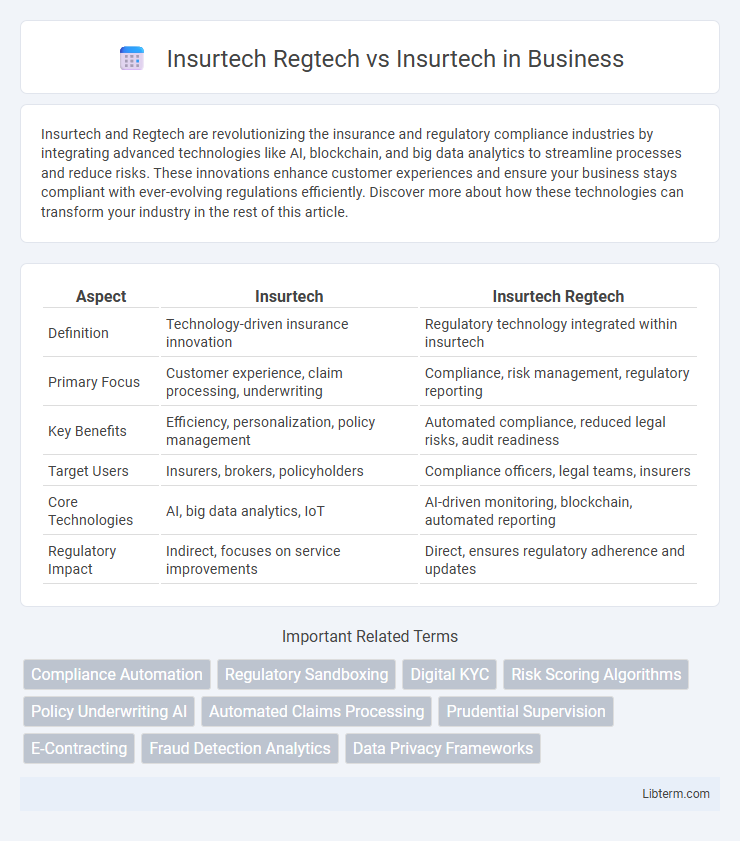Insurtech and Regtech are revolutionizing the insurance and regulatory compliance industries by integrating advanced technologies like AI, blockchain, and big data analytics to streamline processes and reduce risks. These innovations enhance customer experiences and ensure your business stays compliant with ever-evolving regulations efficiently. Discover more about how these technologies can transform your industry in the rest of this article.
Table of Comparison
| Aspect | Insurtech | Insurtech Regtech |
|---|---|---|
| Definition | Technology-driven insurance innovation | Regulatory technology integrated within insurtech |
| Primary Focus | Customer experience, claim processing, underwriting | Compliance, risk management, regulatory reporting |
| Key Benefits | Efficiency, personalization, policy management | Automated compliance, reduced legal risks, audit readiness |
| Target Users | Insurers, brokers, policyholders | Compliance officers, legal teams, insurers |
| Core Technologies | AI, big data analytics, IoT | AI-driven monitoring, blockchain, automated reporting |
| Regulatory Impact | Indirect, focuses on service improvements | Direct, ensures regulatory adherence and updates |
Understanding Insurtech: A Brief Overview
Insurtech refers to the innovative use of technology to improve insurance services, enhancing customer experience and operational efficiency through AI, big data, and automation. Regtech, a subset of insurtech, specifically focuses on regulatory compliance, using technology to streamline risk management and ensure adherence to legal standards. Understanding insurtech involves recognizing its dual role in transforming both the insurance industry's service delivery and its regulatory frameworks.
What is Regtech and Its Impact on Insurance?
Regtech, short for regulatory technology, leverages advanced software to streamline compliance processes within the insurance industry, enhancing risk management and reducing regulatory costs. Its impact on insurance includes automating real-time monitoring, ensuring adherence to evolving regulations, and minimizing the risk of non-compliance penalties. By integrating regtech solutions, insurers improve operational efficiency, data accuracy, and transparency, fostering trust and agility in an increasingly complex regulatory environment.
Key Differences: Insurtech Regtech vs Insurtech
Insurtech Regtech primarily focuses on compliance automation and regulatory technology integration within the insurance industry, streamlining risk management and adherence to legal standards. Insurtech, on the other hand, emphasizes enhancing customer experience, policy management, and claims processing through digital innovation and data analytics. The key difference lies in Insurtech Regtech's specialization in regulatory compliance solutions, whereas Insurtech broadly targets operational efficiency and customer-centric services in insurance.
Regulatory Challenges Facing Insurtech Companies
Insurtech companies face significant regulatory challenges due to the complex compliance requirements in insurance markets, including data privacy laws, consumer protection regulations, and capital adequacy standards. Regtech solutions specifically address these challenges by automating regulatory reporting, monitoring compliance in real-time, and reducing the risk of penalties through advanced analytics and AI-driven tools. The integration of Regtech within Insurtech platforms enhances operational efficiency while ensuring adherence to evolving regulatory frameworks across different jurisdictions.
How Regtech Enhances Insurtech Compliance
Regtech enhances insurtech compliance by automating regulatory monitoring and reporting processes, reducing the risk of human error and ensuring up-to-date adherence to evolving insurance laws. It integrates advanced data analytics and machine learning to detect suspicious activities and streamline KYC (Know Your Customer) and AML (Anti-Money Laundering) checks within insurtech platforms. This synergy increases operational efficiency, mitigates compliance risks, and accelerates regulatory approvals for insurtech products and services.
The Role of AI and Automation in Insurtech Regtech
AI and automation significantly enhance Insurtech Regtech by streamlining compliance processes and enabling real-time risk assessment in insurance operations. Advanced machine learning algorithms detect fraudulent claims faster and improve underwriting accuracy through predictive analytics. Automated regulatory reporting ensures adherence to evolving insurance regulations, reducing operational costs and minimizing human error.
Benefits of Integrating Regtech into Insurtech Operations
Integrating Regtech into Insurtech operations enhances compliance efficiency by automating regulatory reporting and real-time risk monitoring, significantly reducing manual errors and operational costs. This synergy accelerates the claims processing lifecycle and fraud detection through advanced analytics and AI-driven insights. The combined approach fosters greater transparency and trust among stakeholders, driving innovation while ensuring adherence to evolving legal frameworks.
Real-World Use Cases: Insurtech Regtech Solutions
Insurtech Regtech solutions streamline compliance and risk management within the insurance industry by leveraging AI-driven data analytics, automating regulatory reporting, and enhancing fraud detection. Real-world use cases include automated KYC processes for customer onboarding, real-time monitoring of regulatory changes, and predictive risk assessment to optimize underwriting decisions. These innovations reduce operational costs, improve regulatory adherence, and accelerate claim processing.
Future Trends in Insurtech and Regtech Convergence
The future of Insurtech and Regtech convergence centers on seamless integration of artificial intelligence and blockchain technology to enhance compliance automation and risk management in insurance. Predictive analytics and smart contracts are driving real-time regulatory adherence while improving customer experience and operational efficiency. Enhanced data interoperability between Insurtech and Regtech platforms enables proactive fraud detection and dynamic underwriting processes, shaping a more resilient and transparent insurance ecosystem.
Choosing the Right Approach: Insurtech, Regtech, or Both?
Insurtech focuses on leveraging technology to innovate insurance products, improve customer experience, and streamline claims processing, while Regtech specializes in regulatory compliance, risk management, and reporting automation. Businesses must evaluate their core needs, such as whether operational efficiency or compliance complexity is paramount, to determine whether Insurtech, Regtech, or an integrated approach provides the best ROI. Combining both solutions often offers a comprehensive strategy that simultaneously accelerates digital transformation and ensures adherence to regulatory requirements.
Insurtech Regtech Infographic

 libterm.com
libterm.com